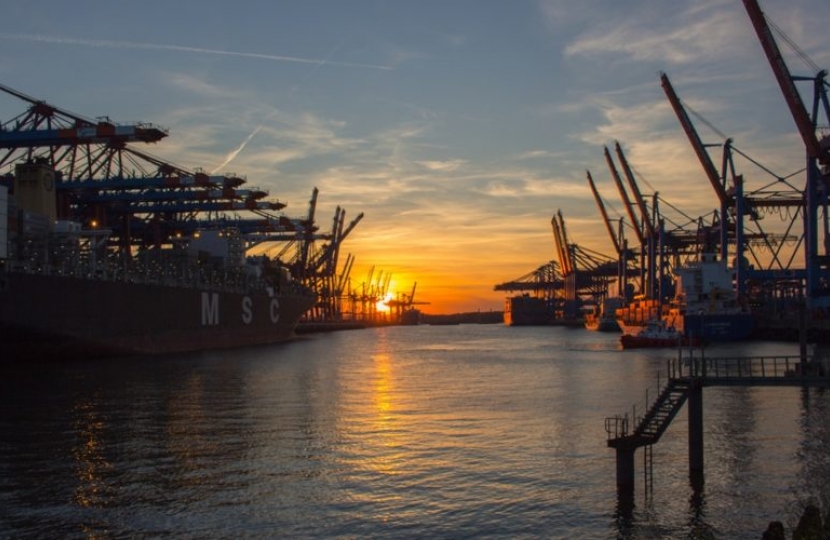
New research released this week (March 10) estimates over 17,000 jobs in Stoke-on-Trent, and 6.5 million jobs across the UK, are supported by exports. Commissioned by the Department for International Trade (DIT) and carried out by the Fraser of Allander Institute (FAI) at the University of Strathclyde, it lifts the lid on the value of exporting-led jobs to the UK economy and helps inform the discussion around the untapped exporting potential of businesses across the country.
This ground-breaking research estimates that median wages in jobs directly and indirectly supported by exports were around 7% higher than the national median and that more jobs (3.7 million) are supported by exports to the rest of the world than to the EU (2.8 million). The Office for National Statistics also estimates that goods exporting businesses are 21% more productive than those who do not. It provides a clear rationale for pursuing an exports-led recovery from Covid and using trade liberalisation to boost strategic industries – such as services, tech and renewables – that are key to building back better from the pandemic.
The FAI research estimates the number of jobs supported by exports at a regional level. DIT is exploring how to develop data that can provide similar insights at an even more local level.
An additional paper released today shows the number of jobs supported by nationally export intensive industries, broken down by constituency. This does not show how many jobs at the local level are export intensive, because local activity can vary significantly from the national average. But the information can act as a starter for a conversation until more granular estimates becomes available. It shows that in Stoke-on-Trent there were some 17,240 jobs (13.9% of total) in industries that were export intensive at a national level in 2019.
The research is accompanied by a new Board of Trade report – Global Britain, Local Jobs – that prescribes a series of policy fixes to unlock the UK’s full exporting potential and propel a trade-led, jobs-led recovery from Covid-19. This includes:
- Boosting the UK’s role as a global hub for services and digital trade.
- Pursuing new trade deals with large and fast-growing economies beyond Europe, particularly in the Indo-Pacific.
- Greater support to help businesses internationalise, and adopt new export targets.
The Board – which is led by International Trade Secretary Liz Truss – argues the UK’s departure from the EU is an opportunity to deepen trade liberalisation and boost the role trade plays in the economy. It argues the UK should follow the likes of Australia, Singapore and New Zealand, who have all used trade liberalisation to spur growth and capture global market share.
The report advocates deeper trade ties with faster growing nations outside Europe, with 65% of the world’s middle classes set to be in the Asia-Pacific by 2030 and nearly 90% of world growth expected to be outside the EU in the next five years.
It recommends the UK ‘ride’ the digital and green waves, highlighting the UK’s comparative advantage in those industries, with the exporting potential of the green economy set to be £170bn per year by 2030, and argues the UK should lead the charge for a more modern, fair and green WTO by working with like-minded allies on issues like industrial subsidies.
The report was launched at a virtual Board of Trade meeting this week, hosted by Truss, and will be sent to MPs and Parliamentarians. It comes ahead of next week’s publication of the Government’s Integrated Review of foreign policy, which will set out the strategy for expanding free and fair trade and making our domestic supply chains more resilient in order to drive prosperity in the UK and around the world.
Liz Truss, International Trade Secretary, said:
“This report shows how Global Britain will deliver jobs and growth across the UK, particularly in areas like the north-west and north-east of England. Export-led jobs are more productive and higher paying, but currently too few businesses export and our economy would benefit from being more international. This potential can be liberated through more trade deals, boosting our role as global hub for digital and services trade, and by pursuing policies that drive an exports-led recovery.
“The opportunity we have as an independent trading nation is huge. Today’s report outlines how we can do things differently and capitalise on defining trends like the emergence of Asia’s middle classes and rapid growth in the Indo-Pacific.”
Jack Brereton MP said:
“Stoke-on-Trent has a proud history of exporting ceramics, and while we maintain strong links to the industry today we have diversified to a great range of sectors including vehicle manufacture, creating chemical products, and rubber and plastics. I will work with the Department for International Trade to ensure we can protect these jobs and create more, taking the opportunities leaving the EU offers us.”
Jonathan Gullis MP said:
“This research is most welcome and shows that Stoke-on-Trent has great potential to continue and expand its reputation as a world-renowned ceramics hub. There is also a clear path to securing many thousands of new, hi tech jobs of the future for the city, by placing Stoke-on-Trent at the heart of the new, digital revolution through our ambition to create Silicon Stoke. I am excited about helping Stoke-on-Trent play a full role in helping the UK boost its reputation as a global hub for digital services and trade.”
Jo Gideon MP said:
“This research is good news for Stoke-on-Trent. The numbers show just how much opportunity we have as a city to capitalise on our new status as a sovereign and independent trading nation outside of the EU. I will continue to work with the Department for International Trade to ensure that we fully utilise the opportunity that we have to create higher-paid employment in higher-value industries, building on our city’s proud industrial heritage and securing our future as a world leader in advanced manufacturing, technology, research and innovation.”
